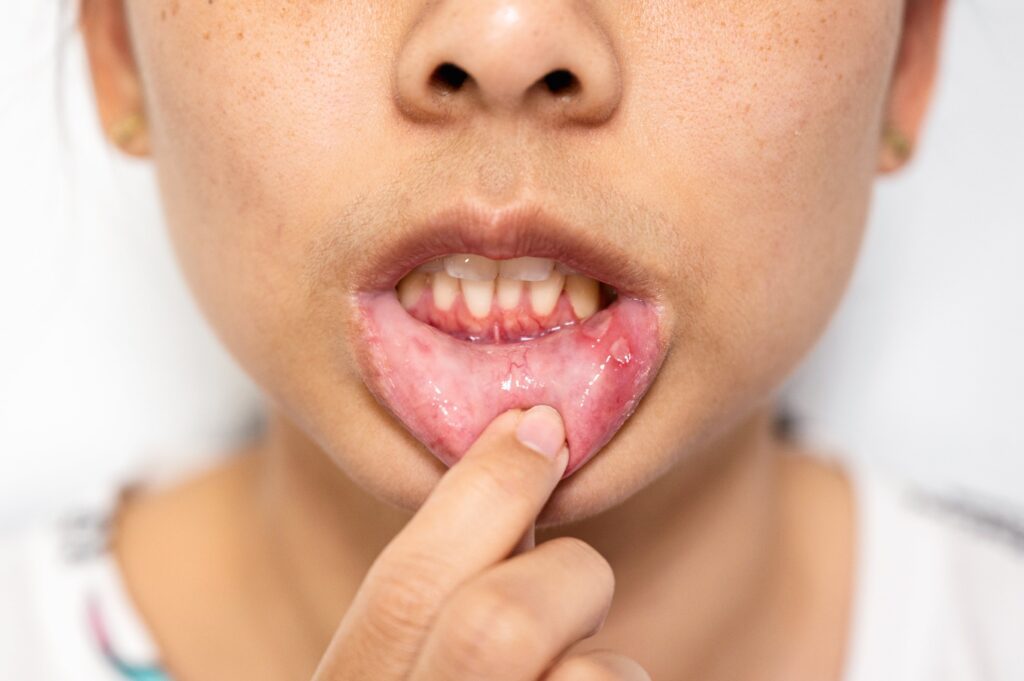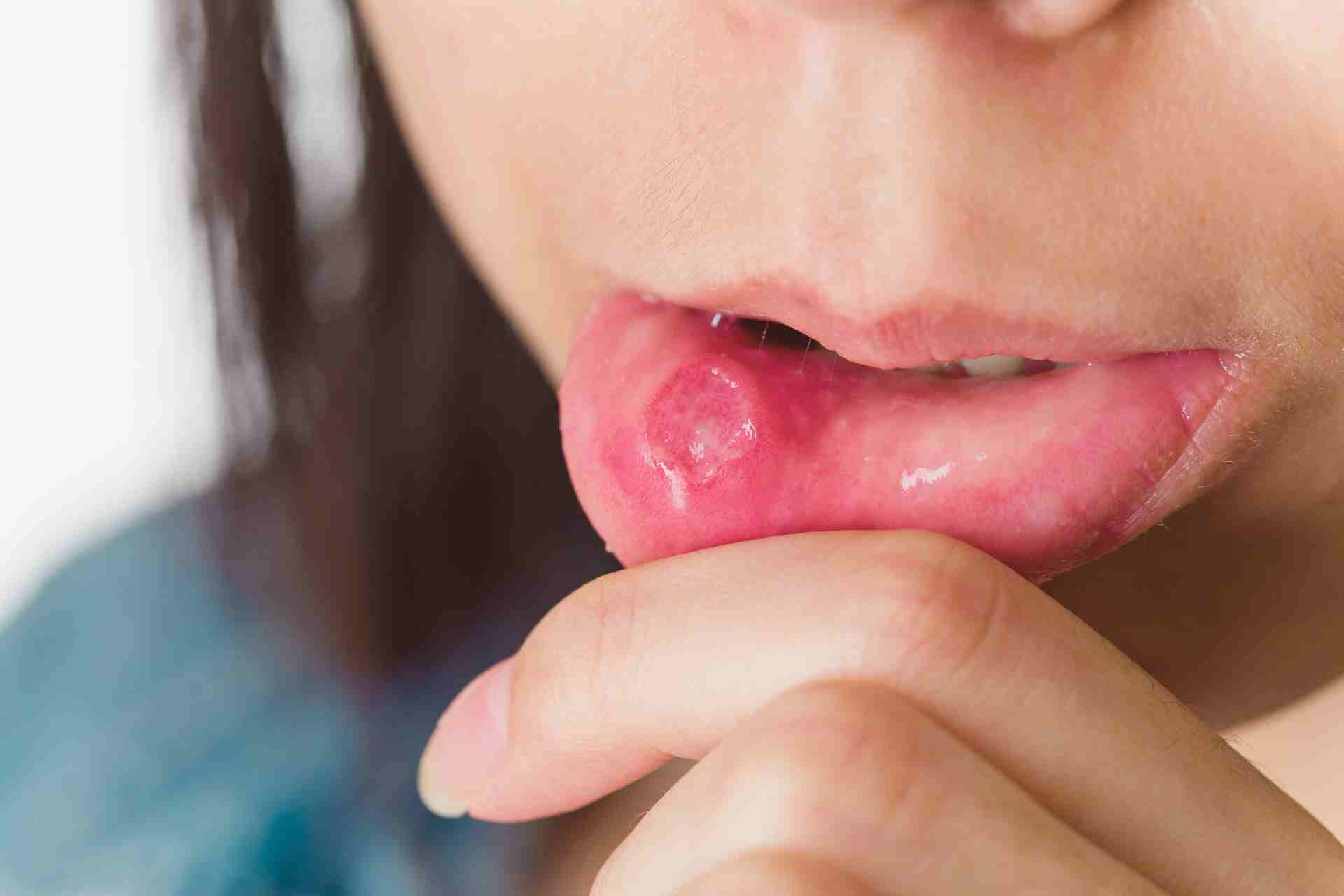Highlights
- Canker sores usually heal in 1–2 weeks, but home remedies can ease pain and speed recovery.
- Salt water rinses, numbing gels, and avoiding spicy or acidic foods are effective at-home treatments.
- Staying hydrated and protecting the sore with milk of magnesia can help reduce irritation.
- Dentists can provide prescription rinses or laser treatment if sores are severe or persistent.
- Prevention tips include managing stress, eating a balanced diet, and using a soft toothbrush to lower your risk of recurring sores.
Canker sores can be downright irritating, can’t they? These small but painful ulcers often pop up unexpectedly, making something as simple as eating or talking uncomfortable. The good news? Most canker sores heal on their own within 1–2 weeks, but with the right care, you can ease discomfort and speed up recovery. Whether it’s a mild case or a particularly pesky sore, there are simple steps you can take to feel better quickly. Our goal is to help you understand what works and why, so you can get back to feeling like yourself.
What Are Canker Sores?

Canker sores, also known as aphthous ulcers, are small, shallow sores that develop inside the mouth. They can appear on the inner cheeks, gums, tongue, or even the roof of your mouth. These little sores are usually round or oval with a white, yellow, or grayish center and a reddish border.
How Are Canker Sores Different From Cold Sores?
Many people confuse canker sores with cold sores, but they’re not the same thing.
- Canker sores happen inside the mouth and are not caused by a virus.
- Cold sores, on the other hand, are caused by the herpes simplex virus and appear outside the mouth (often around the lips).
One of the key differences? Canker sores are not contagious, while cold sores can spread from person to person.
Related Reading: How Long Are Cold Sores Contagious?
Are Canker Sores Painful?
Yes, they can be! Although they’re typically harmless, canker sores can feel uncomfortable or even painful, especially when eating, drinking, or speaking. The good news? Most canker sores heal on their own within a week or two. If you experience frequent or severe sores, it’s a good idea to check in with your dentist.
Common Causes of Canker Sores
Canker sores can be uncomfortable and frustrating, but understanding their common causes might help you prevent them in the future. Here are some of the most typical triggers:
- Stress or lack of sleep – Emotional or physical stress and not getting enough rest can weaken your immune system and make you more prone to developing sores.
- Minor mouth injuries – Small injuries like accidentally biting your cheek, irritation from braces, or dental work can lead to canker sores.
- Acidic or spicy foods – Foods like citrus fruits, tomatoes, or hot peppers may irritate the mouth and trigger sores in sensitive individuals.
- Vitamin deficiencies – A lack of essential nutrients like vitamin B12, iron, or folate can increase your risk.
- Hormonal changes – Hormonal shifts, often experienced during periods, pregnancy, or menopause, can also play a role.
How Long Do Canker Sores Normally Last?
Canker sores are pretty common and, thankfully, they don’t usually stick around for too long. Most canker sores heal on their own within 7–14 days. During this time, the discomfort tends to lessen as the sore heals. However, if your canker sore lasts longer than three weeks, it’s a good idea to see your dentist. Prolonged healing can sometimes indicate an underlying issue that needs attention.
To speed up the healing process or manage the pain, you can try a few remedies, like over-the-counter oral rinses, avoiding spicy or acidic foods, and keeping your mouth clean
How to Heal Canker Sores Fast: At-Home Remedies

There are several simple, effective remedies you can try at home to ease pain and promote faster healing. Here’s how:
Rinse With Warm Salt Water
A warm salt water rinse is one of the easiest and most effective ways to soothe a canker sore. Salt water reduces bacteria in your mouth, eases pain and inflammation, and supports the body’s natural healing process. Try rinsing your mouth gently 2–3 times a day for the best results.
Use an Over-the-Counter Oral Rinse or Gel
Products like antimicrobial mouthwash or numbing gels can provide relief during daily activities like eating or speaking. These help reduce irritation and discomfort, giving the sore a better environment to heal. Look for trusted products from your local pharmacy, and apply them as directed.
Avoid Irritating Foods
Spicy, acidic, or salty foods can exacerbate pain and prevent your canker sore from healing. Stick to soft, bland foods like yogurt, mashed potatoes, or scrambled eggs until the sore improves. Keeping your meals gentle is key to speeding up recovery.
Stay Hydrated
Drinking plenty of water is essential for tissue repair and overall oral health. Staying hydrated keeps your body functioning at its best and supports healing from the inside out. You can also try sipping cold water or sucking on ice chips to temporarily ease irritation.
Apply a Milk of Magnesia Dab
Using milk of magnesia can help create a protective coating over the canker sore, shielding it from further irritation. It also helps neutralize acidity around the sore, giving the tissue time to heal. Dab it on the sore with a cotton swab a few times a day for relief.
By incorporating these tips into your routine, you can reduce discomfort and help your canker sore heal more quickly.
Related Reading: Mouth Sores Relief
Professional Treatments for Severe Canker Sores
When over-the-counter remedies don’t provide enough relief, your dentist can offer simple and effective treatments to tackle severe canker sores. These include:
- Prescription oral rinses to reduce pain and inflammation.
- Corticosteroid ointments that accelerate healing and lessen discomfort.
- Laser treatment for instant pain relief and faster recovery. This innovative option is safe, quick, and non-invasive.
The good news? These treatments are straightforward and tailored to your needs, ensuring you feel better in no time.
How to Prevent Future Canker Sores

Canker sores can be frustrating and uncomfortable, but with a few simple steps, you can reduce the chances of them developing. Prevention often starts with small changes to your daily habits and routines.
- Manage stress: Practice relaxation techniques like meditation or exercise to keep stress levels in check, as stress can trigger canker sores.
- Eat a balanced diet: Ensure your meals include enough vitamins and minerals, especially B12, iron, and folate, which play a role in oral health.
- Use a soft-bristled toothbrush: A softer brush can help prevent irritation to your gums and cheeks, reducing the risk of sore formation.
- Avoid known food triggers: Spicy, acidic, or overly salty foods may aggravate the mouth lining. Be mindful of foods that tend to cause irritation for you.
- Schedule regular dental checkups: Professional cleanings and advice from your dentist can help you maintain optimal oral health while addressing any underlying concerns.
When to See a Dentist
It’s normal for occasional canker sores to heal after a week or so, but there are times when seeking professional attention is important:
- Sores lasting longer than 2–3 weeks without improvement.
- Very large or spreading sores that worsen over time.
- Extreme pain that makes it difficult to eat, drink, or speak comfortably.
- Frequent recurring sores, which could indicate a larger issue.
Frequently Asked Questions
What is the fastest way to get rid of a canker sore?
Rinsing with warm salt water, avoiding spicy foods, and using numbing gels or antimicrobial mouthwash can speed up healing and ease discomfort.
Are canker sores contagious?
No. Unlike cold sores, canker sores are not contagious and cannot be spread through kissing or sharing utensils.
Why do I keep getting canker sores?
Common triggers include stress, mouth injuries, vitamin deficiencies, and certain foods like citrus or spicy dishes. A dentist can help identify patterns and suggest prevention tips.
Should I worry if a canker sore won’t heal?
If a sore hasn’t healed after 3 weeks or seems to be getting worse, it’s best to see a dentist to rule out other oral health issues.
Can I prevent canker sores from coming back?
Yes. Managing stress, eating a balanced diet, using a soft toothbrush, and avoiding foods that irritate your mouth can all help reduce recurrence.
Dealing With Frequent or Painful Canker Sores? We’re Here To Help
Canker sores are a common issue that can cause discomfort, but with proper care, they typically heal on their own. Simple steps like avoiding irritating foods, practicing good oral hygiene, and using soothing treatments can help ease the pain and speed up the healing process. Remember, focusing on prevention can make a big difference in managing this issue over time.
Contact me to schedule an appointment or send a quick message on Instagram. We’ll work with you to find the best solutions for your comfort and care.





















